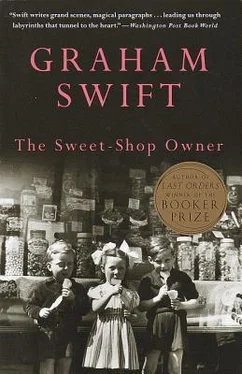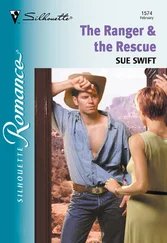Graham Swift - The Sweet-Shop Owner
Здесь есть возможность читать онлайн «Graham Swift - The Sweet-Shop Owner» весь текст электронной книги совершенно бесплатно (целиком полную версию без сокращений). В некоторых случаях можно слушать аудио, скачать через торрент в формате fb2 и присутствует краткое содержание. Год выпуска: 2012, Издательство: Vintage Books USA, Жанр: Современная проза, на английском языке. Описание произведения, (предисловие) а так же отзывы посетителей доступны на портале библиотеки ЛибКат.
- Название:The Sweet-Shop Owner
- Автор:
- Издательство:Vintage Books USA
- Жанр:
- Год:2012
- ISBN:нет данных
- Рейтинг книги:4 / 5. Голосов: 1
-
Избранное:Добавить в избранное
- Отзывы:
-
Ваша оценка:
- 80
- 1
- 2
- 3
- 4
- 5
The Sweet-Shop Owner: краткое содержание, описание и аннотация
Предлагаем к чтению аннотацию, описание, краткое содержание или предисловие (зависит от того, что написал сам автор книги «The Sweet-Shop Owner»). Если вы не нашли необходимую информацию о книге — напишите в комментариях, мы постараемся отыскать её.
The Sweet-Shop Owner — читать онлайн бесплатно полную книгу (весь текст) целиком
Ниже представлен текст книги, разбитый по страницам. Система сохранения места последней прочитанной страницы, позволяет с удобством читать онлайн бесплатно книгу «The Sweet-Shop Owner», без необходимости каждый раз заново искать на чём Вы остановились. Поставьте закладку, и сможете в любой момент перейти на страницу, на которой закончили чтение.
Интервал:
Закладка:
There he was, at his shoulder, in the outer lane. Brow wet, chin jutting. He could force him back, if he wanted to, run faster. The power was there. Thirty yards to go. Neck and neck. Sun in their eyes. Twenty, fifteen.
All right. Now.
35
You were standing in the hallway with the front door open. I had seen the car parked outside as I drove up Leigh Drive. The blue Mini — his Mini; the boot open and already packed with boxes, clothes on hangers, polythene bags, jumble. You didn’t know I was there. You must have been upstairs when I pulled up on the drive. And you weren’t expecting me. It was only five on a sunny evening in May. You didn’t know I had this pain in my chest, attacks of breathlessness, and that that afternoon I’d shut the shop early. Otherwise, you chose your moment well.
I got out of the car, walked over to the Mini, then in at the front gate. There were tulips out by the front path. You were standing at the foot of the stairs, sideways on, adjusting your grip on a loaded cardboard box. It was one of the cardboard boxes in which goods used to arrive at the shop. You raised it up from beneath with your knee. You hadn’t seen me and weren’t expecting me. When people aren’t expecting to be seen they look their truest. How innocent you looked. You were wearing jeans and a white blouse, and the way you shifted the box with your leg was so determined, so absorbed. Then, as you turned, you looked up and saw me. Your eyes hardened, as if a childish prank had turned suddenly into a crime. But before that they flickered: a moment of fear, of precariousness, as if, if I’d made a sudden move, you might have toppled.
‘Father.’
‘Dorry.’
My eyes took their photograph of that moment. Your face framed in the doorway; half turned; your profile caught in the mirror behind. You looked trapped. In the box you were carrying I saw the edge of the little wooden chest — polished walnut with a brass catch — in which Irene had kept her jewels. You didn’t have a key. You must have known where I put them — in the drawer of the bureau.
‘Dorry, what are you doing?’
You clung to the cardboard box as if I’d have wrenched it from you.
‘I’m taking the last of my things.’
‘Those are her things.’
‘ Were. They’re mine now.’
I stood on the porch steps, my keys in my hand. You had occupied the house and were forbidding me entrance. There was a pain in my chest like a metal bar, which you weren’t aware of. We stood like that, for what seemed an infinity. I thought: I can see what ought to happen, what should happen; but it won’t, it will turn the other way. If you hadn’t been holding that box I would have stepped forward to embrace you.
‘Dorry, let’s talk.’
‘No. Not now.’
Your voice was exasperated rather than defiant. I noticed another cardboard box at the foot of the stairs with one of her fur stoles inside, just visible beneath a sheet of brown paper. I remembered when she bought it.
‘Dorry, we ought to talk. We can settle this.’
You shook your head. The box was getting heavy in your hands, but you clung to it like a defence.
‘Will you let me take this to the car?’
There were a score of phrases ready to hand — ‘Now listen here my girl … You’ve no right … Take those things back this minute’ — but I said nothing. I thought: I’m not going to fight; if there is no fight then no one wins.
I said, ‘Dorry, what are you doing?’
The weight of the box was beginning to threaten your pose. You raised it again with your knee. There was a moment when it seemed your act of daring might end in comic catastrophe — necklaces strewn over the stairs, emeralds and pearls over the hall carpet. But you steadied yourself, propping the box against the stair-post.
I stepped inside. ‘Why didn’t you tell me you were coming?’
A stupid question, I know. But it made it seem as if I’d half expected you; that the fact that you were looting the house wasn’t important.
‘Oh don’t worry — I would have left you a note!’
Your brow knotted. If I had fought you it would have been so much easier, wouldn’t it?
‘Dorry, I had no idea —’
‘Well you’ve caught me in the act, haven’t you? I thought you’d be at your shop.’ You hissed the last word.
‘I shut the shop early today. I’m not so well, you know, Dorry: I have to take things easier —’
‘Well if it’s all such a strain why don’t you shut that bloody shop for good! Give it up for good!’ Your fingers clawed at the box. Then you added suddenly: ‘You can now, can’t you? She’s been dead nine months, you know!’
That was your victory cry. You stepped forward, hug-ging the box, as if you knew you could step through me. I didn’t prevent you. On the wall behind you was your photograph — you in her arms, with me looking on, at your christening. I held my side. I said, ‘Look, I’m not well. I’ve got to sit down. Come to me — when you’ve finished.’
But I didn’t go to sit down at once. I leant against the stair-post like some dumb, helpless statue, while you passed to and fro, ignoring me, taking away her things like trophies. I thought: she gave you to me in place of what she couldn’t give herself; now you are taking from me what had been hers. Through the open door, I watched you lay her furs on the back seat of the car, carefully, lovingly — a way you never treated her.
When you passed me for the fourth time I said, ‘I’ll be in there,’ and tottered into the living-room. I sat in the armchair, facing the windows, with my back straight, my knees square in front of me and my arms on the arm-rests as if I were made of bronze. The garden was in shade but there was sun on the lilac tree. I said to myself: I will give you the money. And when I give you the money I will give up the shop. But first you must come to me one last time.
Upstairs you were opening and closing drawers. I thought, Mrs Pritchard will learn of it, Mrs Cooper will get wind of it. I would have to perform for her benefit, invent another legend: ‘You see, that’s what daughters do, Mrs Cooper, that’s the thanks you get for all your trouble.’ I heard you pass in the hall. You said nothing, not even ‘Goodbye’.
36
Bryant and Miss Fox looked up over the counter, amazed, as if they hadn’t expected to see him; then they looked doubly shocked, seeing the state he was in — gasping, sweat pouring off him.
‘Didn’t you come in the car?’ Bryant asked.
He leant on the counter.
‘I walked. It’s all right.’
‘Quick, Susan — a chair for Mr Chapman.’
Miss Fox opened the flap in the counter, brought out a wooden, round-backed chair, and he sat down in it, like an honoured customer.
‘And a glass of water, if you wouldn’t mind,’ he said.
He reached for the bottle of pills in his pocket.
‘Why on earth did you walk?’ said Bryant, almost scoldingly. ‘In this weather. You shouldn’t.’
‘It’s all right. I know what I’m doing. Be fine in a moment.’
Bryant was bald on top but with sleek growths of pale hair at the back and sides; he wore thick glasses over brown, needly eyes. Miss Fox just turned twenty, was plump and brisk.
‘There,’ he said, having dissolved the tablet under his tongue and drained the tumblerful of water.
They both still looked at him as if he were some escaped convict.
Normally on Fridays he got to Pond Street at a quarter to three. It was half-past three now. Not such a great difference. But they seemed to sense everything had changed.
‘Well — what’s new?’
Bryant tried to appear unperplexed. He rubbed his chin uneasily. ‘Oh — average week. Ice-cream and soft drinks up, of course, with the weather. Sure you’re okay?’
Читать дальшеИнтервал:
Закладка:
Похожие книги на «The Sweet-Shop Owner»
Представляем Вашему вниманию похожие книги на «The Sweet-Shop Owner» списком для выбора. Мы отобрали схожую по названию и смыслу литературу в надежде предоставить читателям больше вариантов отыскать новые, интересные, ещё непрочитанные произведения.
Обсуждение, отзывы о книге «The Sweet-Shop Owner» и просто собственные мнения читателей. Оставьте ваши комментарии, напишите, что Вы думаете о произведении, его смысле или главных героях. Укажите что конкретно понравилось, а что нет, и почему Вы так считаете.












